Famine in Somalia may refer to:
- 1992 famine in Somalia, which killed 200,000–300,000 people in Somalia
- 2011 East Africa drought, which killed 260,000 people in Somalia
Famine in Somalia may refer to:
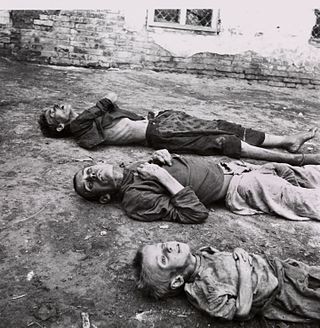
A famine is a widespread scarcity of food caused by several possible factors, including, but not limited to war, natural disasters, crop failure, widespread poverty, an economic catastrophe or government policies. This phenomenon is usually accompanied or followed by regional malnutrition, starvation, epidemic, and increased mortality. Every inhabited continent in the world has experienced a period of famine throughout history. During the 19th and 20th century, Southeast and South Asia, as well as Eastern and Central Europe, suffered the greatest number of fatalities. Deaths caused by famine declined sharply beginning in the 1970s, with numbers falling further since 2000. Since 2010, Africa has been the most affected continent in the world by famine.
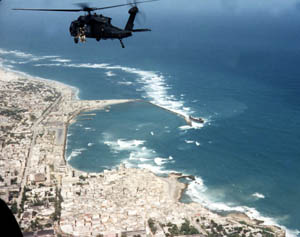
The Battle of Mogadishu, also known as the Black Hawk Down Incident, was part of Operation Gothic Serpent. It was fought on 3–4 October 1993, in Mogadishu, Somalia, between forces of the United States—supported by UNOSOM II—against the forces of the Somali National Alliance (SNA) and armed irregulars of south Mogadishu.

Mengistu Haile Mariam is an Ethiopian former politician and former military officer who was the head of state of Ethiopia from 1977 to 1991 and General Secretary of the Workers' Party of Ethiopia from 1984 to 1991. He was the chairman of the Derg, the Marxist-Leninist military junta that governed Ethiopia, from 1977 to 1987, and the president of the People's Democratic Republic of Ethiopia (PDRE) from 1987 to 1991.

Fazul Abdullah Mohammed was a Comorian-Kenyan member of al-Qaeda, and the leader of its presence in East Africa. Mohammed was born in Moroni, Comoros Islands and had Kenyan as well as Comorian citizenship. He spoke French, Swahili, Arabic, English, and Comorian.

Burao, also spelt Bur'o or Bur'ao, is the capital of the Togdheer region and the second largest city in Somaliland. Burao was the site of the declaration of an independent Somaliland on 18 May 1991.

Keinan Abdi Warsame, better known by his stage name K'naan, is a Somali-Canadian rapper, singer and filmmaker. He rose to prominence with the success of his single "Wavin' Flag", which was chosen as Coca-Cola's promotional anthem for the 2010 FIFA World Cup. Besides hip hop, K'naan's sound is influenced by elements of Somali music and world music. He is also involved in various philanthropic initiatives.
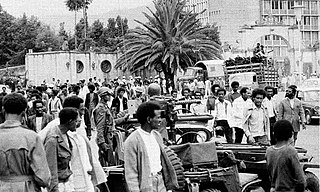
The Ethiopian Civil War was a civil war in Ethiopia and present-day Eritrea, fought between the Ethiopian military junta known as the Derg and Ethiopian-Eritrean anti-government rebels from 12 September 1974 to 28 May 1991.
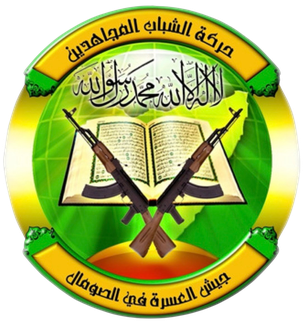
Harakat al-Shabaab al-Mujahideen, commonly known as al-Shabaab, is a Sunni Islamist military and political organization based in Somalia and active elsewhere in East Africa. It is actively involved in the ongoing Somali Civil War and incorporates elements of Somali nationalism into its Islamist cause. Allegiant to the militant pan-Islamist organization al-Qaeda since 2012, it has also been suspected of forging ties with al-Qaeda in the Islamic Maghreb, and al-Qaeda in the Arabian Peninsula.
Muhammad Omar, and other spellings such as Mohamed Omer, may refer to the following people:

The 2009 timeline of events in the Somalia War (2006–2009) during January 2009 is set out below. From the beginning of February the timeline of events in the Somali Civil War (2009–present) is set out following the conclusion of the previous phase of the civil war.

The Somali Civil War (2009–present) is the ongoing phase of the Somali Civil War which is concentrated in southern and central Somalia. It began in late January 2009 with the present conflict mainly between the forces of the Federal Government of Somalia assisted by African Union peacekeeping troops and al-Shabaab militants who pledged alliegence to al-Qaeda during 2012.
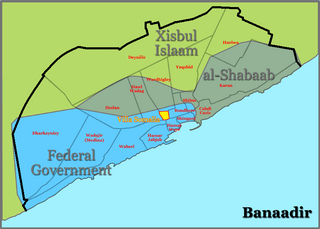
The Battle of Mogadishu (2010–11) began on 23 August 2010 when al-Shabaab insurgents began attacking government and African Union Mission to Somalia (AMISOM) positions in the Somali capital of Mogadishu. Al-Shabaab began its offensive after its spokesman said the group was declaring a "massive war" on troops sent by AMISOM, describing its 6,000 peacekeepers as "invaders". In December 2010 the number of AMISOM troops was increased to 8,000 and later to 9,000. The battle's name usually includes the years, when referenced, in order to distinguish it amongst the nine major Battles of Mogadishu during the decades long Somali Civil War.
Events from the year 2011 in Algeria

Occurring between July 2011 and mid-2012, a severe drought affected the entire East African region. Said to be "the worst in 60 years", the drought caused a severe food crisis across Somalia, Djibouti, Ethiopia and Kenya that threatened the livelihood of 9.5 million people. Many refugees from southern Somalia fled to neighboring Kenya and Ethiopia, where crowded, unsanitary conditions together with severe malnutrition led to a large number of deaths. Other countries in East Africa, including Sudan, South Sudan and parts of Uganda, were also affected by a food crisis.
The 2011 Mogadishu bombing occurred on 4 October 2011, when a suicide bomber drove a truck into the gate of the Transitional Federal Government's ministerial complex in Mogadishu, Somalia. The resulting explosion killed 100 people and injured over 110 others. Al-Shabaab, an Islamist group, claimed responsibility for the attack. The attack is reported to be the largest since Al-Shabaab launched an insurgency in Somalia in early 2007. It also follows the withdrawal of Al-Shabaab's forces from the area in August after an AMISOM intervention to bring aid to the country during a season of drought.

In 2017 a drought ravaged Somalia that has left more than 6 million people, or half the country's population, facing food shortages with several water supplies becoming undrinkable due to the possibility of infection.

Cyclonic Storm Sagar was the strongest tropical cyclone to make landfall in Somalia and Somaliland in recorded history until Gati in 2020, and the first named cyclone of the 2018 North Indian Ocean cyclone season. Forming on May 16 east of the Guardafui Channel, Sagar intensified into a cyclonic storm on the next day, as it gradually organized. The storm turned to the west-southwest and traversed the entirety of the Gulf of Aden, making landfall over Somaliland on May 19, farther west than any other storm on record in the North Indian Ocean. Sagar weakened into a remnant low on May 20.
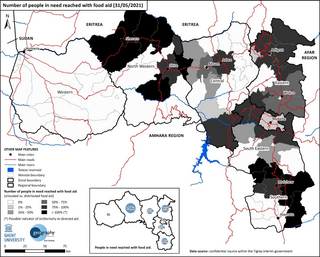
Beginning with the onset of the Tigray War in November 2020, acute food shortages leading to death and starvation became widespread in northern Ethiopia, and the Tigray, Afar and Amhara Regions in particular. As of August 2022, there are 13 million people facing acute food insecurity, and an estimated 150,000–200,000 had died of starvation by March 2022. In the Tigray Region alone, 89% of people are in need of food aid, with those facing severe hunger reaching up to 47%. In a report published in June 2021, over 350,000 people were already experiencing catastrophic famine conditions. It is the worst famine to happen in East Africa since 2011–2012.

On 29 October 2022, 121 people were killed and over 300 were injured by a double car bombing in Somalia's capital, Mogadishu. President Hassan Sheikh Mohamud accused Sunni jihadist group al-Shabaab of carrying out the attacks, which they admitted. The bombing marks the deadliest attack in Somalia since the 14 October 2017 Mogadishu bombings at the same junction.